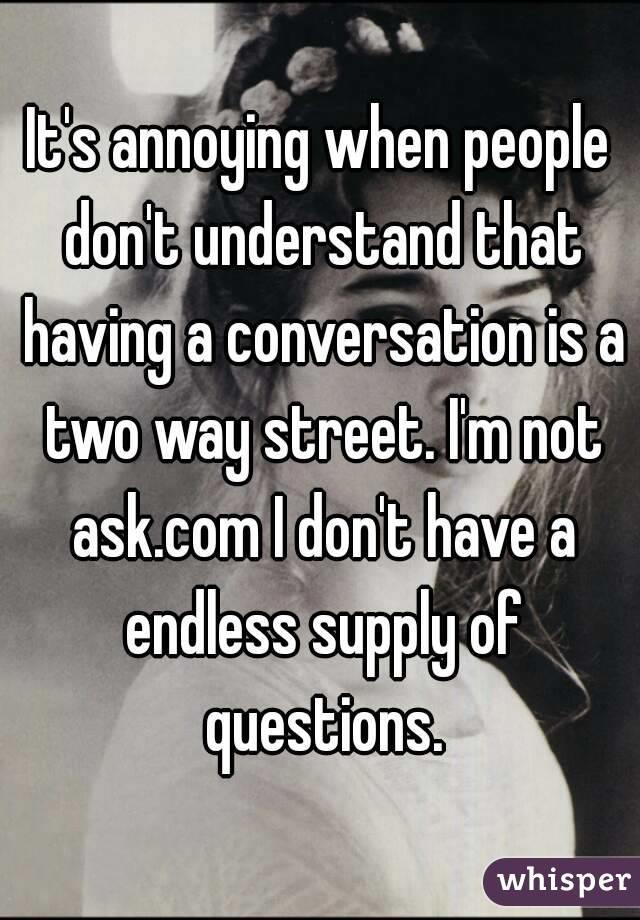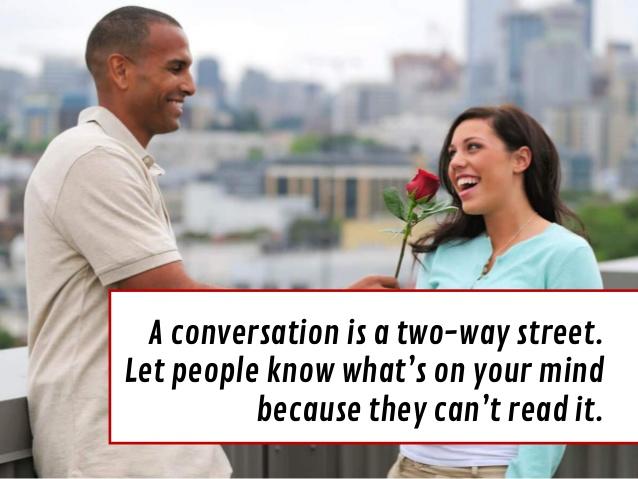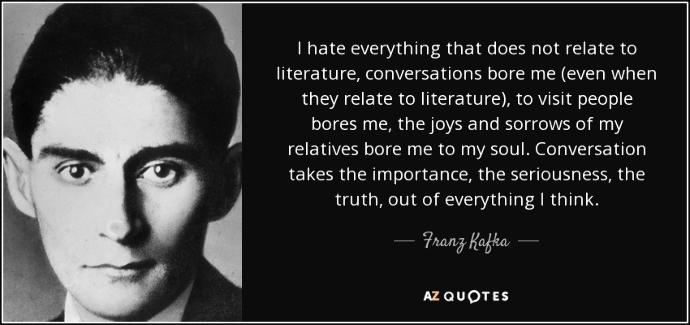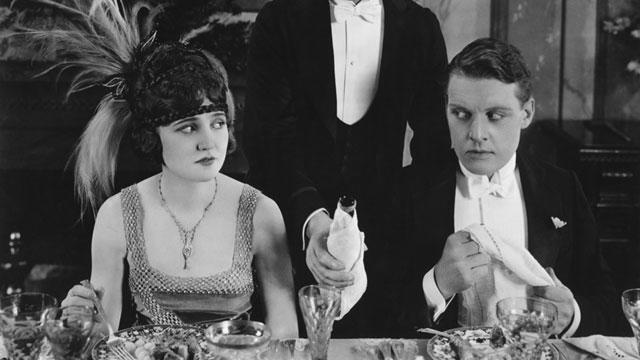As a matter of fact, have you never noticed that most conversations are simply monologues delivered in the presence of witnesses?
Margaret Millar - The Weak-Eyed Bat
I think that this has to be one of the worst and most damaging phrases to enter popular culture. Of course, the fault does not belong to the original author per se but it has been something used to promote the art of listening. Well, listening is a two way street, and it is never one person with all the ability in the world to ask questions and sit back and listen to the most boring of conversation partners.
Nor should it ever be the burden of one person to be constantly forced to probe and ask further details from a person who would prefer to sit-back and give monosyllabic answers to every question an interested conversation partner has to ask about the other participant within a dialogue (*ahem*, girls - I'm looking at you!).

And yes! it is indeed called a dialogue for a good reason:


Perhaps this statement was not originally intended in such a manner (it is hard to determine), but popular psychologists, self-improvement gurus and other such writers have been quick to jump on the bandwagon to proclaiming the passive act of listening the most important tool in our repertoire, Dale Carnegie being the most notorious, in my opinion:
I met a distinguished botanist at a dinner party given by a New York book publisher and I found him fascinating. He spoke of exotic plants and experiments in developing new forms of plant life and indoor gardens. There must have been a dozen other guests, but I violated all the canons of courtesy, ignored everyone else, and talked for hours to the botanist. Later that evening, the botanist turned to our host and paid me several flattering compliments. I was "most stimulating" and a "most interesting conversationalist". I had said hardly anything at all. But I had done this: I had listened intently because I was genuinely interested. And he felt it.
In many ways the entire book is based on this principle: the art of listening - or more generally still, the power of appealing to another person's ego. I do not want to sit here and say that this is a bad conversation tact or that it never works. Rather what I want to say is that there are at least three situations in which it does not work:
1. The person is an expert in their subject and does not feel like divulging in complex, technical details with the average layman who has no such knowledge of the talker's passion.
2. The person is mundane or superficial: the type of person that would rather give your questions monosyllabic answers and whip out their i-Phone than talk to you (although it must be said that Carnegie had not yet been introduced to the wonders of modern technology).
3. The person is an aggressive conversation bore who takes the opportunity to walk all over you.
In all fairness to Carnegie, however, he does take time to mention the latter kind of beast:
"Africa!" I exclaimed "How interesting! I've always wanted to see Africa, but I never got there except for a twenty-four-hour stay once in Algiers. Tell me, did you visit the big-game country? Do tell me about Africa." That kept her talking for forty-five minutes. She didn't want to hear me talk about my travels. All she wanted was an interested listener, so she could expand her ego.

What to talk about?
But this is not the point of the mytake. The point is the following: conversation has become a neglected art. People have become wrapped up in the superficialities of modern technology and commercial culture, that they barely have an interesting word to say.

And where there are other people, there has always been gossip: malicious rumours and other forms of negative expression about ones peers and neighbours whenever they happen to not be within a local vicinity.

People will scoff at the modern conversationalist: the man who wants to refine his knowledge about the diverse areas of culture, economics, philosophy, history, arts and humanities in general. A person that wants to talk about and learn more about these things is thought of as:
- a pedantic bore
- somebody that thinks too highly of himself
- sometimes even, a person who is soft or effeminate (as is the case when dealing with cultural machoism)

Sometimes I do find myself relating to this mindset. But I do feel that this speaks out about the current state of affairs of the world (or rather, absence) of communication and not just myself and like-minded individuals such as Franz Kafka.
And the first two points in some situations and of certain people may well be the case. However, if conversation is a two-way street, as I believe I have demonstrated, then it is necessary for both parties to possess a wide repertoire of interesting, factual knowledge that can be shared in an informal and not overly imposing setting but in short, sharp snaps of fascinating exchanges. What if a person does not possess such knowledge? Then they will be relegated to the mundane task of 'small talk':
- discussing the weather
- asking a person how she or he is
- talking about one's own weekend

Naturally, there is nothing wrong with these topics, however an individual with anxiety or social awkwardness will be at a loss for words in some settings - mainly social events, but also some professional situations and surviving day to day routines that involve human contact. The popular psychology and self-improvement advice for such individuals has always been the following:
- be yourself
- be confident
- smile and have open body language
- be positive

Conclusion
Anybody that is somewhat au fait with my takes on this website will know more details about why I am opposed to this particular trend of so-called wisdom. And this trend needs to change. Their needs to be more literature dedicated to the specific art of conversation. This is a lost art in a world that has become immersed in the superficialities of technologies and commercialism and a very challenging art in a world where people's minds are tuned in to very narrow attention spans - after all, why listen to somebody's boring conversation about politics or national geography when you can change the T.V. channel or open up yet another tab on your laptop?
Why bother with culture at all, in fact when it is a far less intellectually daunting task to see what your friends have posted on their twitter account? I would feel guilty if I left this article with no written advice on my own behalf of what conversation topics to use. For this reason, I will take the time to link in the Top 10 Conversation Topics from peopleskillsdecoded.com and the promise that a future take of mine will be dedicated to exploring such an area in more detail.
 Holidays
Holidays  Girl's Behavior
Girl's Behavior  Guy's Behavior
Guy's Behavior  Flirting
Flirting  Dating
Dating  Relationships
Relationships  Fashion & Beauty
Fashion & Beauty  Health & Fitness
Health & Fitness  Marriage & Weddings
Marriage & Weddings  Shopping & Gifts
Shopping & Gifts  Technology & Internet
Technology & Internet  Break Up & Divorce
Break Up & Divorce  Education & Career
Education & Career  Entertainment & Arts
Entertainment & Arts  Family & Friends
Family & Friends  Food & Beverage
Food & Beverage  Hobbies & Leisure
Hobbies & Leisure  Other
Other  Religion & Spirituality
Religion & Spirituality  Society & Politics
Society & Politics  Sports
Sports  Travel
Travel  Trending & News
Trending & News
Most Helpful Opinions